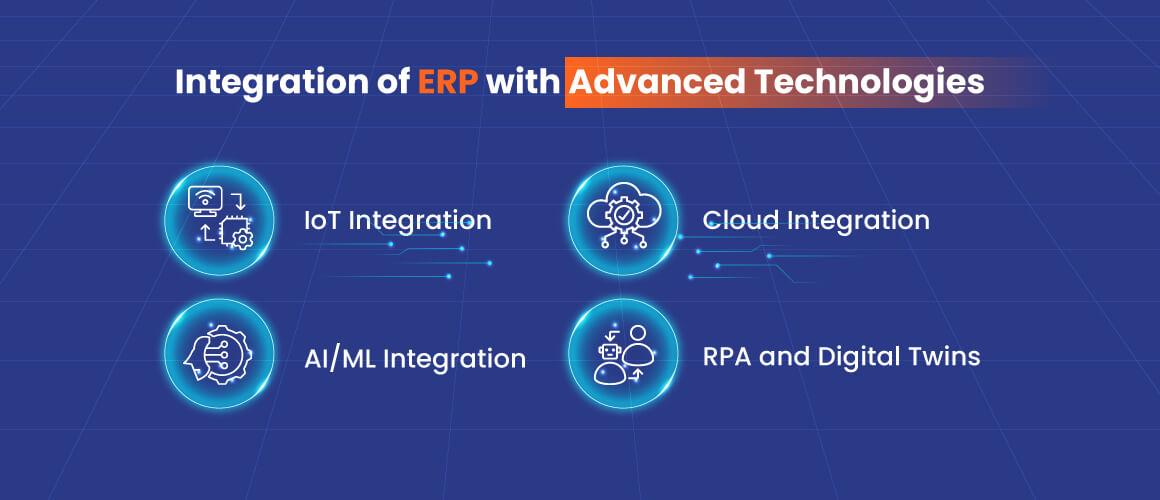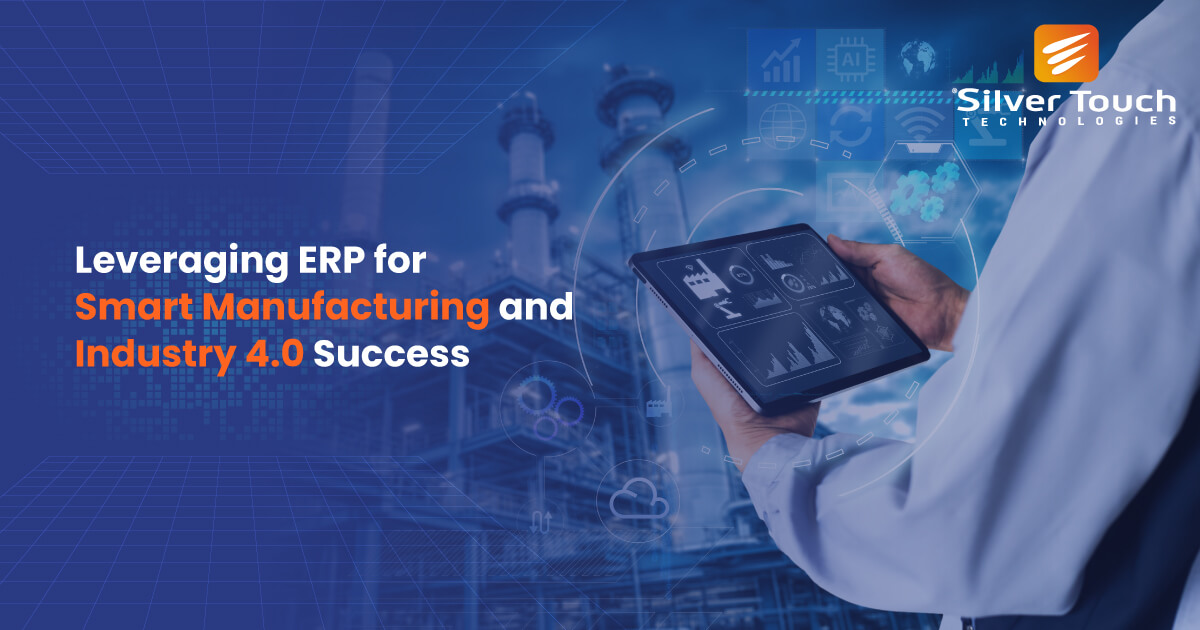The modern manufacturing scenario is witnessing transformation because of changing customer needs and market trends. Forward-looking manufacturers consider adopting the concepts of Smart Manufacturing and Industry 4.0 to stay ahead of the curve while increasing productivity. Manufacturing ERP software can assist them to embrace advancing technologies.
In this post, we will discuss the role of cloud ERP for manufacturing in Industry 4.0 and its key benefits for the modern manufacturing sector. Let’s start with introducing a Smart Manufacturing concept.
Overview of Smart Manufacturing
Smart manufacturing is an approach that uses all emerging technologies of Industry 4.0 to build a more efficient and flexible production environment. Here, the integration of all digital technologies into all aspects from design to production and supply chain management to customer service. Here we mention the key characteristics of Smart Manufacturing-
Automation with Optimization
AI technology is useful for automating and optimizing processes, reducing manual intervention, and increasing efficiency.
Real-time Visibility
Real-time data from all departments of the manufacturing company enables manufacturers to monitor performance and make informed decisions.
Predictive Maintenance
An AI-powered approach in Smart Manufacturing is useful for reducing downtime and optimizing equipment performance.
Flexibility and Agility
Manufacturers can adapt quickly to changing customer demands and market trends with the help of Smart Manufacturing.
Supply Chain Connectivity
Smart Manufacturing is useful for connecting supply chains resulting in better collaboration and more visibility.
Smart Manufacturing ERP solution is useful for leveraging the benefits of emerging technologies and driving Industry 4.0. Let’s dig deep into the role of ERP for Industry 4.0.
Role of Manufacturing ERP Software in Industry 4.0
Industry 4.0 or Fourth Industrial Revolution refers to the ongoing process of transforming manufacturing processes with help of digital technologies. It involves future-ready technologies including AI, IoT, automation, and Big Data. ERP for Industry 4.0 can act as a centralized platform to integrate various data sources and processes across the manufacturing industry.
Modern ERP solutions for the manufacturing sector bring flexibility and scalability to enable manufacturers to adapt to the dynamic demands of the market and expectations of customers. In other words, these ERP solutions can make the manufacturing sector more agile and responsive. As a result, manufacturers can get a competitive edge.
Moreover, a cloud ERP for manufacturing is useful for managing processes of different departments including production, inventory, finance, and supply chain. It empowers manufacturers with actionable insights. It is fair to mention that manufacturing ERP software is essential for leveraging the potential of Industry 4.0 and its interconnected system.
Integration of ERP with Advanced Technologies

A smart manufacturing ERP has built-in integrated technologies of Industry 4.0. Here is an array of advanced technologies in manufacturing ERP solutions-
IoT Integration
This integration is necessary to get real-time data from different tools or equipment at the manufacturing unit. Smart manufacturing ERP software can collect data related to machine performance, inventory levels, and production-related processes.
ERP systems can get and process real-time data with the help of IoT platforms. This integration enables ERP software to use this data to trigger automated actions, identify trends, and enable predictive maintenance.
AI/ML Integration
AI and ML technologies are capable of analyzing vast amounts of corporate data. Manufacturing companies can leverage the benefits of these technologies to predict trends, streamline processes, and identify patterns. ERP systems integrate with AI and ML to enhance demand forecasting and quality control.
Moreover, ERP solutions leverage AI for optimizing production schedules and improving the overall efficiency of the manufacturing company through improved resource allocation.
Cloud Integration
A cloud ERP for manufacturing can reduce upfront costs and increase the scalability of operations with improved accessibility. This solution can eliminate the need for expensive on-premises hardware and software. Manufacturers can get the benefits of remote collaboration using cloud-based ERP solutions.
Cloud-powered ERP solutions are capable of handling fluctuating demand and driving growth. They can act as a bridge between employees, vendors, and customers for better collaboration and more efficiency.
RPA and Digital Twins
These are relatively new approaches but gaining ground quickly in the manufacturing sector. ERP can integrate with RPA to manage the automation of repetitive tasks. It can also monitor the performance of software bots and reduce human intervention significantly.
The digital twin technology is useful for representing physical assets and systems virtually. They can simulate and optimize manufacturing operations. ERP can act as a central repository for the data useful for digital twins.
These ERP integrations offer many benefits to the thriving manufacturing sector.
Key Benefits of Cloud ERP for Manufacturing
Apart from increasing efficiency and productivity, an ERP for the manufacturing sector can offer many benefits. Here we mention some key benefits-
Improved Quality Control
ERP solutions can detect deviation and malfunctioning quickly and accurately with the help of AI, ML, and Big Data integration. It facilitates manufacturers to take corrective measures proactively. Moreover, automated quality inspections, powered by ML, can also reduce the risk of human errors.
Better Decision-Making
ERP systems can give real-time reports from different departments. As a result, manufacturers can get actionable insights to make informed decisions. Instant visibility and accurate data related to key performance indicators (KPIs) can also improve the decision-making process.
Reduced Operational Costs
Predictive maintenance and improved inventory management can reduce operational costs significantly. On one hand, predictive maintenance can reduce maintenance expenses, and on the other hand, inventory management can prevent stockouts. This can also reduce storage costs.
Enhanced Customer Satisfaction
This is one of the biggest benefits of manufacturing ERP software. It facilitates manufacturers to offer accurate delivery estimates to their customers with real-time order tracking and more visibility. Reduced lead times also contribute in quicker delivery of products with better communication with customers.
Increased Agility with Innovation
ERP systems offer the necessary flexibility to manufacturers to adapt to changing market conditions and customer demands. It can make the company agile. Moreover, integration with advanced technologies like digital twins facilitates innovation and development of new products.
Though ERP has multiple benefits to offer, it is imperative to choose the right ERP solution provider to leverage these benefits.
Concluding Remarks
A smart manufacturing ERP can be a game-changer for the modern manufacturing industry. It can collect and analyze data accurately to reduce operational costs, streamline processes, and improve decision-making with better quality control. However, manufacturers should integrate advancements of AI, ML, and IoT in the ERP for Industry 4.0 to get these benefits.
Silver Touch Technologies is a leading manufacturing ERP software provider. As an official SAP Partner, we provide manufacturers with high-end cloud ERP solutions. Contact us to learn more about the scope of ERP for Industry 4.0 and its benefits for your manufacturing company.



